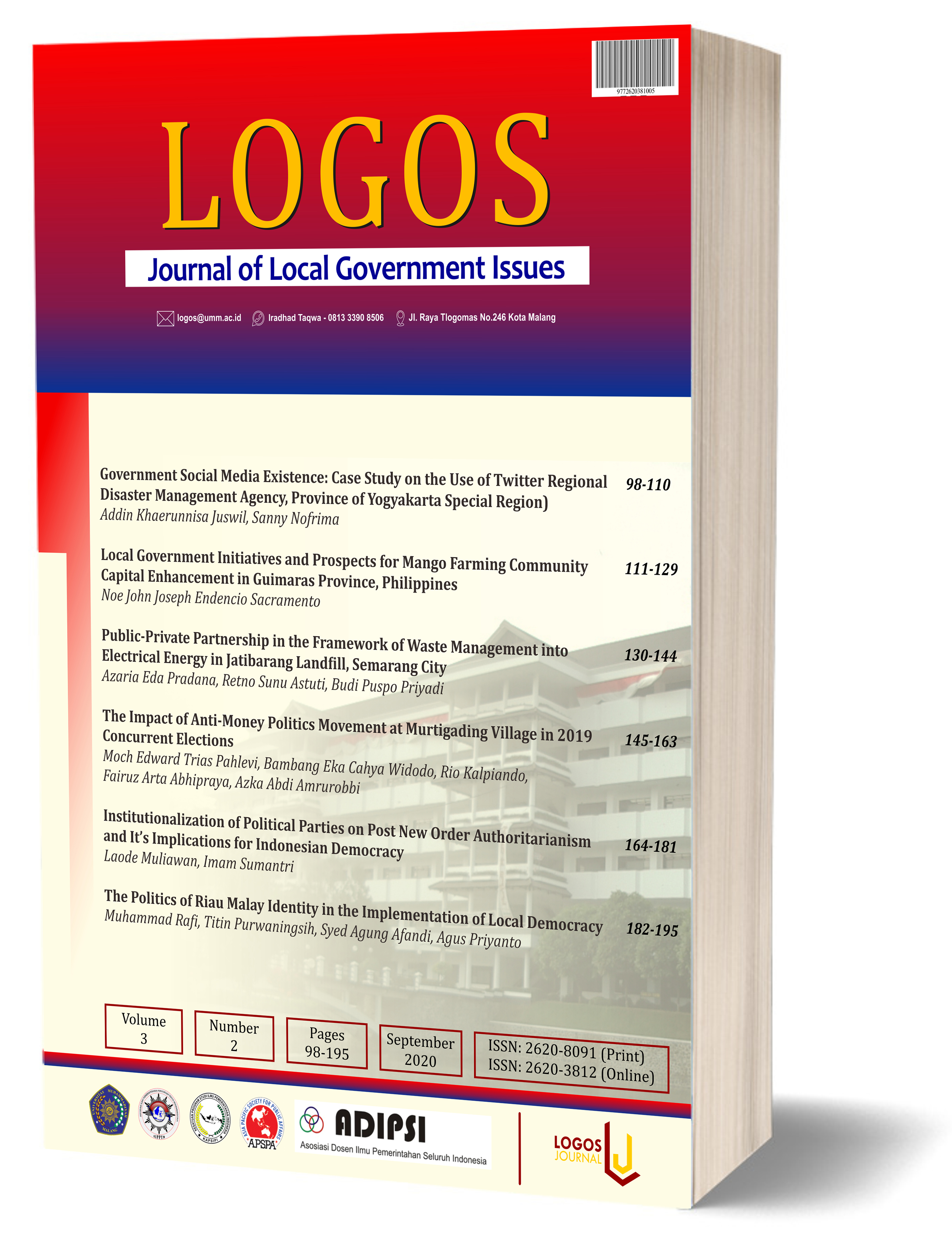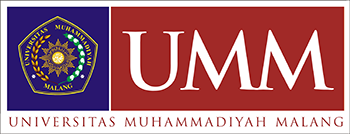The Impact of Anti-Money Politics Movement at Murtigading Village in 2019 Concurrent Elections
DOI:
https://doi.org/10.22219/logos.v3i2.12962Keywords:
anti-money politics movement, 2019 concurrent election, money politicsAbstract
The Indonesian elections still face money politic practices as one of the electoral issues. This political transactional transforms into a new typical behavior and even becomes a culture for Indonesian citizen in every election. This lousy culture currently became the significant factor in gaining a victory for candidates, such as for 2019 concurrent election. Money politic practices are not only harmful to electoral integrity but also has a long-term impact on a new behavior to produce corruptors. This study seeks to examine the evaluation and impact of Anti-Money Politic Village movement in Murtigading Village, Bantul Regency, Special Region of Yogyakarta for 2019 concurrent election. This study used a quantitative method. The primary source for this study was obtained from survey techniques. This study leads to the three main conclusions such as: first, Murtigading community considers money politics as a form of bribery action and potentially harmful for democracy value. Second, Murtigading community considers that movement can decrease the practice of money politics in Murtigading village. Third, Murtigading community fully supports the existence of that movement and support to establish the legal regulations in local village government to create more political education among the community quickly
Downloads
References
Abhipraya, F. A., Sadayi, D. P., & Putri, F. A. (2020). Peran Komite Independen Sadar Pemilu (KISP) sebagai LSM Kepemiluan dalam Melawan Praktik Politik Uang. Politicon: Jurnal Ilmu Politik, 2(2), 165-190. https://doi.org/10.15575/politicon.v2i2.8556
Aspinall, E., & Berenschot, W. (2019). Democracy for Sale: Elections, Clientelism, and the State in Indonesia: New York: Cornell University Press.
Berenschot, W. (2018). The Political Economy of Clientelism: A Comparative Study of Indonesia’s Patronage Democracy. Comparative Political Studies, 51(12), 1563-1593. https://doi.org/10.1177%2F0010414018758756
Cahyadi, R., & Hermawan, D. (2019). Strategi Sosial Pencegahan Politik Uang di Indonesia. Jurnal Antikorupsi INTEGRITAS KPK RI, 5(1), 29-41. https://doi.org/10.32697/integritas.v5i1.338
Creswell, J. W., & Creswell, J. D. (2017). Research Design: Qualitative, Quantitative, and Mixed Methods Approaches: London:Sage publications.
Donatella, D. P., & Diani, M. (1999). Social Movements: An introduction: Victoria: Wiley Blackwell.
Fitriyah, F. (2015). Cara Kerja Politik Uang (Studi Kasus Pilkada dan Pilkades di Kabupaten Pati). Politika: Jurnal Ilmu Politik, 6(2), 101-111. https://doi.org/10.14710/politika.6.2.2015.101-111
Giddens, A., & Sutton, P. W. (2013). Sociology, 7 Th Edition: Cambridge: Polity Press.
Hellmann, O. (2011). Book Review of'building Party Systems in Developing Democracies', by Allen Hicken. Party politics., 17(5), 703-705. https://doi.org/10.1177%2F13540688110170050803
Manfaat, B. (2018). Analisis Data Kuantitatif. https://www.researchgate.net/publication/329589047_Analisis_Data_Kuantitatif
Manzetti, L., & Wilson, C. J. (2007). Why do Corrupt Governments Maintain Public Support?. Comparative Political Studies, 40(8), 949-970. https://doi.org/10.1177%2F0010414005285759
Mietzner, M. (2015). Dysfunction by Design: Political Finance and Corruption in Indonesia. Critical Asian Studies, 47(4), 587-610. https://doi.org/10.1080/14672715.2015.1079991
Muhtadi, B. (2013). Politik Uang dan Dinamika Elektoral di Indonesia: Sebuah Kajian Awal Interaksi Antara “Party-ID” dan Patron-Klien. Jurnal Penelitian Politik, 10(1), 41-58.
Muhtadi, B. (2018). Buying Votes in Indonesia: Partisans, Personal Networks, and Winning Margins. Dissertation: The Australian National University.
Muhtadi, B. (2018). Komoditas Demokrasi: Efek Sistem Pemilu Terhadap Maraknya Jual Beli Suara. Dalam buku Pembiayaan Pemilu di Indonesia, 95-117. Jakarta:Bawaslu.
Muhtadi, B. (2019). Politik Uang dan New Normal dalam Pemilu Paska-Orde Baru. Integritas: Jurnal Antikorupsi, 5(1), 55-74. https://doi.org/10.32697/integritas.v5i1.413
Nail, M. H. (2019). Kualifikasi Politik Uang dan Strategi Hukum Dan Kultural Atas Pencegahan Politik Uang Dalam Pemilihan Umum. Jurnal Yuridis, 5(2), 245-261. http://dx.doi.org/10.35586/.v5i2.770
Omobowale, A. O. (2008). Clientelism and Social Structure: An Analysis of Patronage in Yoruba Social Thought. Africa Spectrum, 43 (2), 203-224.
Pahlevi, M. E. T., & Amrurobbi, A. A. (2020). Pendidikan Politik dalam Pencegahan Politik Uang Melalui Gerakan Masyarakat Desa. Integritas: Jurnal Antikorupsi, 6(1), 141-152. https://doi.org/10.32697/integritas.v6i1.611
Rahmat, A., & Hasan, E. (2017). Upaya Panwaslih Aceh Mengusut Kasus Politik Uang pada Pilkada Tahun 2017 di Pidie Jaya. Jurnal Ilmiah Mahasiswa Fakultas Ilmu Sosial & Ilmu Politik, 2(4).
Riewanto, A. (2019). Strategi Hukum Tata Negara Progresif Mencegah Politik Uang Pemilu Serentak. Integritas: Jurnal Antikorupsi, 5(1), 111-125. https://doi.org/10.32697/integritas.v5i1.363
Sihidi, I. T., Khanifah, L. N., & Romadhan, A. A. (2019). Relasi Politik Uang Dan Party-Id di Indonesia. Cosmogov, 5(2), 204-220. https://doi.org/10.24198/cosmogov.v5i2.23293
Sjafrina, A. G. P. (2019). Dampak Politik Uang Terhadap Mahalnya Biaya Pemenangan Pemilu dan Korupsi Politik. Integritas: Jurnal Antikorupsi, 5(1), 43-53. https://doi.org/10.32697/integritas.v5i1.389
Sugiyono, D. (2010). Metode Penelitian Kuantitatif dan R&D. Bandung: Alfabeta.
Sukmajati, M., & Aspinal, E. (2015). Politik Uang di Indonesia. Yogyakarta: PolGov.
Tarrow, S. G. (2011). Power in Movement: Social Movements and Contentious Politics. Cambridge:Cambridge University Press.
Interview
Ahmad, February 18, 2020
Fauzi Noor, February 18, 2020
Fauzi Noor, May 9, 2020
Downloads
Published
How to Cite
Issue
Section
License
Copyright (c) 2020 Moch Edward Trias Pahlevi, Bambang Eka Cahya Widodo, Rio Kalpiando, Fairuz Arta Abhipraya, Azka Abdi Amrurobbi

This work is licensed under a Creative Commons Attribution-ShareAlike 4.0 International License.
Authors who publish with this journal agree to the following terms:
- Authors retain copyright and grant the journal right of first publication with the work simultaneously licensed under a Creative Commons Attribution-ShareAlike 4.0 International License. that allows others to share the work with an acknowledgment of the work's authorship and initial publication in this journal.
- Authors are able to enter into separate, additional contractual arrangements for the non-exclusive distribution of the journal's published version of the work (e.g., post it to an institutional repository or publish it in a book), with an acknowledgment of its initial publication in this journal.
- Authors are permitted and encouraged to post their work online (e.g., in institutional repositories or on their website) prior to and during the submission process, as it can lead to productive exchanges, as well as earlier and greater citation of published work (See The Effect of Open Access).

This work is licensed under a Creative Commons Attribution-ShareAlike 4.0 International License.













